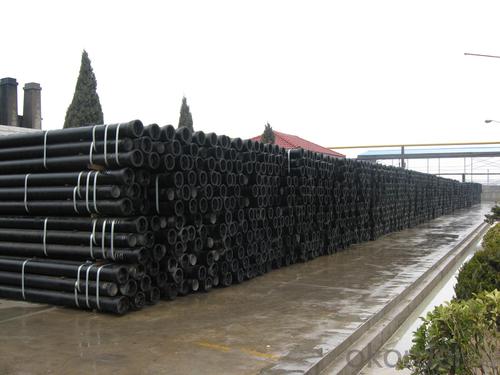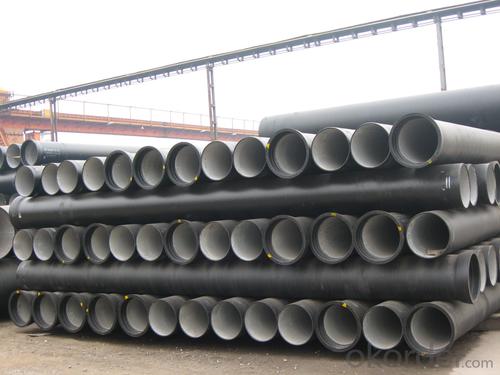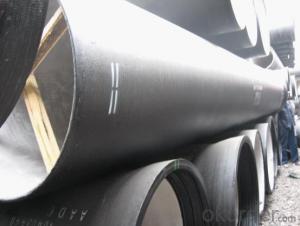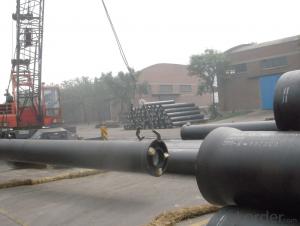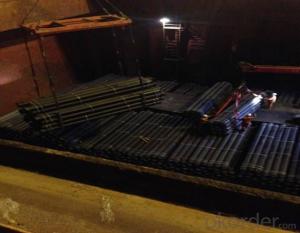DUCTILE IRON PIPE DN350 K8
- Loading Port:
- China Main Port
- Payment Terms:
- TT or LC
- Min Order Qty:
- 20 m.t.
- Supply Capability:
- -
OKorder Service Pledge
OKorder Financial Service
You Might Also Like
Specification:
1) The standard of pipe: ISO2531:1998, K9
2) Effective length: 6m
3) Inner cement line: Portland cement line as per ISO4179
4) Zinc coating: at least 130g/m2 as per ISO8179
5) Bitumen painting: at least 70um as per ISO8179
6) With 100% quantity of NBR ring, or SBR ring, or EPDM ring as per ISO4633
7) DN80mm-800mm
8) High strength, lighter than grey iron, good corrosion resistance, no furring, small flow resistance, easy fixing, long life tome about 100 yeas
9) Produced by Hangzhou chunfeng machine
10) Checked by automatic inspection equipment
11) Composition:
Chemical composition | ||||||
Chemical composition | Ductile Cast Iron Pipe (%) | Grey iron pipe (%) | Steel pipe (%) | |||
C | 3.5-4.0 | 3.2-3.8 | 0.1-0.2 | |||
Si | 1.9-2.6 | 1.4-2.2 | 0.15-0.4 | |||
Mn | 0.15-0.45 | 0.4-0.6 | 0.3-0.6 | |||
P | ≤0.06 | ≤0.3 | 0.02-0.03 | |||
S | ≤0.02 | ≤0.1 | 0.02-0.03 | |||
Mg | 0.03-0.06 | |||||
12) Feature:
Mechanical properties | ||||||
Ductile Cast Iron Pipe | Grey Iron Pipe | Steel Pipe | ||||
Tensile Strength(Mpa) | ≥420 | 150-260 | ≥400 | |||
Yield Strength(Mpa) | ≥300 | No Confirmation | No Confirmation | |||
Bending Strength(Mpa) | ≥590 | 200-360 | ≥400 | |||
Elongation (%) | ≥10 | Neglected | ≥18 | |||
Brinell Hardness(HBS) | ≤230 | ≤230 | About 140 | |||
13) T type mechanical joint
14) Packing: in bulk or container
Our main material are all carbon steel and alloy steel.
- Q: What is the typical pressure rating of ductile iron pipes?
- The typical pressure rating of ductile iron pipes ranges from 150 to 350 PSI (pounds per square inch), depending on the diameter and class of the pipe.
- Q: What are the different pressure classes available for ductile iron pipe?
- The different pressure classes available for ductile iron pipe include Class 100, Class 150, Class 200, Class 250, Class 300, Class 350, and Class 400.
- Q: What are the requirements for the hydrostatic test of ductile iron pipes?
- The hydraulic pressure test shall be carried out in the backfill before trying to allow the pressure after passing the backfill, backfill, the graded gravel fill to 300mm above the top of pipe, and then the soil backfill, backfill process by 200~300 tamped pipeline above 500mm within more than 500 can be used in artificial ramming, mechanical compaction. The degree of compaction shall not be less than 0.93.
- Q: Are ductile iron pipes suitable for use in irrigation sprinkler systems?
- Yes, ductile iron pipes are suitable for use in irrigation sprinkler systems. Ductile iron pipes are known for their durability, strength, and corrosion resistance, making them an ideal choice for various applications, including irrigation systems. These pipes have a high tensile strength and can withstand high pressure and heavy loads, which is essential for maintaining a consistent water supply to sprinkler systems. Additionally, ductile iron pipes have a long lifespan, reducing the need for frequent maintenance and replacement, making them a cost-effective option for irrigation systems. Overall, ductile iron pipes are a reliable and suitable choice for use in irrigation sprinkler systems.
- Q: Are ductile iron pipes resistant to chemicals or solvents?
- Ductile iron pipes possess a general resistance to a wide variety of chemicals and solvents. This resistance can be attributed to their composition, which consists of a high percentage of iron and carbon, as well as small amounts of other alloying elements like silicon, manganese, and magnesium. These alloying elements contribute to the overall strength and durability of the pipes, thereby making them highly resistant to corrosion and chemical attacks. However, it is important to acknowledge that the resistance of ductile iron pipes to chemicals and solvents may vary depending on the specific substance and its concentration. Certain aggressive chemicals or solvents, especially those with high levels of acidity or alkalinity, may gradually corrode or degrade the material of the pipes over time. In such instances, it is advisable to consult the pipe manufacturer or a professional engineer to ensure the compatibility of the pipes with the specific chemicals or solvents being used. Furthermore, the proper installation and maintenance practices are critical factors in preserving the chemical resistance of ductile iron pipes. Regular inspections, cleanings, and the application of protective coatings can assist in extending the lifespan and performance of the pipes when exposed to various chemicals or solvents.
- Q: Are ductile iron pipes suitable for use in hydropower projects?
- Yes, ductile iron pipes are suitable for use in hydropower projects. Ductile iron pipes have a high tensile strength and are resistant to corrosion, making them ideal for applications in hydropower projects where water flow and pressure are involved. They are capable of withstanding high pressure and are durable, ensuring long-term reliability and safety in hydropower systems. Additionally, ductile iron pipes are cost-effective compared to other materials like steel, making them a popular choice for hydropower projects. Overall, ductile iron pipes offer the necessary characteristics and performance qualities required for the demanding conditions of hydropower projects.
- Q: Can ductile iron pipe be recycled?
- Yes, ductile iron pipe can be recycled. It is a highly recyclable material that can be melted down and reused in the production of new ductile iron products. Recycling ductile iron pipe helps reduce waste and conserves natural resources.
- Q: Is the crankshaft material forged or ductile iron?
- Other crankshafts are not clear about the car crankshaft. These two materials are useful, but the trend is to use ductile iron
- Q: How are ductile iron pipes different from cast iron pipes?
- Ductile iron pipes are different from cast iron pipes in terms of their composition and properties. Ductile iron pipes are made from a type of cast iron that has been treated with magnesium to improve its strength and flexibility. This makes ductile iron pipes more durable, impact-resistant, and less prone to cracking or breaking compared to traditional cast iron pipes. Additionally, ductile iron pipes have a higher tensile strength, allowing them to withstand higher internal and external pressures. In summary, ductile iron pipes are a more modern and advanced version of cast iron pipes, offering improved performance and longevity.
- Q: How much pressure can the ductile iron pipe socket meet?
- If you let him as the supporting points, I do not recommend this
Send your message to us
DUCTILE IRON PIPE DN350 K8
- Loading Port:
- China Main Port
- Payment Terms:
- TT or LC
- Min Order Qty:
- 20 m.t.
- Supply Capability:
- -
OKorder Service Pledge
OKorder Financial Service
Similar products
Hot products
Hot Searches
Related keywords


